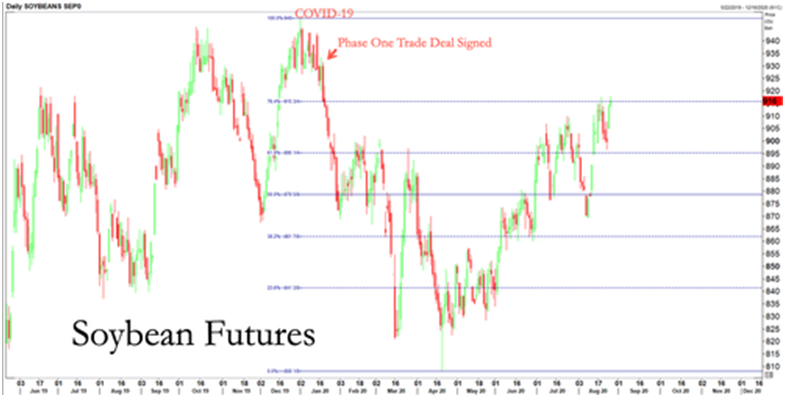

01.09.2020 – Special Report. The Chinese are suddenly sending out conciliatory signals regarding the customs dispute. And this is not by chance. The mood in the US election campaign is changing. We shed light on the current state of affairs and opportunities for investors and traders.
Hiding Biden
Presumably the Communists in Beijing wanted to sit out the U.S. election campaign. And why not: a new president Joe Biden would be a guarantee that punitive tariffs would be reduced. After all, the former vice president and ex-president Barack Obama had allowed China to destroy parts of American industry with dumping products, such as steel and textiles.
But apparently the Chinese no longer believe in Sleepy Joe. In fact, in the latest survey by the Rasmussen polling institute – the only one that was correct in 2016 – Biden is only one percentage point ahead of Trump; a few weeks ago it was ten points. Whereby national polls are irrelevant anyway, because there are millions of votes in the popular republics of California and New York that fall to the Dems anyway. The Swing States are important. Like Wisconsin.
They talk again
Probably the Chinese have followed all this very closely. Last Monday, U.S. Trade Representative Robert Lighthizer and Treasury Secretary Steven Mnuchin spoke on the phone with Chinese Vice Prime Minister Liu He. The call was originally scheduled for August 15, six months after the first day of the agreement. However, because of China’s cover-ups in the Corona pandemic and the totalitarian crackdown in Hong Kong, U.S. President Donald Trump had postponed the appointment. US economic adviser Larry Kudlow told Fox News that China is buying more agricultural commodities, which will secure jobs in the US. “The meeting went quite well.”
But now China is really buying soya
The Bloomberg news agency also reported in the middle of last week, citing unnamed sources, that American and Chinese officials had confirmed that the Phase 1 deal was still valid. And that China is planning a record amount of soy purchases in the near future. In total, the Middle Kingdom is planning to make purchases of 40 million tons this year. China has actually increased its purchases of US agricultural goods since the end of April. Ergo, the soybean futures in Chicago recently rose to a seven-month high.

So far nothing but empty words
However, there is probably a lot of wishful thinking in this reaction. Bloomberg estimates that in the first seven months China has only fulfilled around 27 percent of its obligations under the trade deal. And the US Department of Agriculture reported only meager purchases of 408,000 tons of corn and 204,000 tons of soybeans on Tuesday. The Chinese government now announced increased purchases at the end of the year. And the blog ZeroHedge, citing Reuters, judged that China had completed just five percent of its promised energy purchases worth around 25 billion dollars in the first half of the year.
Our conclusion: The recent positive comments on the customs dispute look very much like an election campaign on the US side – with a view to the farmers in the Midwest. And on the Chinese side it could be the usual delaying tactic.
However, it is quite possible that Beijing will go shopping after all because of a feared comeback of Trump. Then the previous week would also be the week of change in terms of the customs deal. If China fills the deal with life, it would be bullish for some assets. Especially for soybeans, the Chinese stock market and also for Wall Street. And of course for the yuan – which strengthened in the previous week from 6.92 to 6.87 against the US dollar. We keep an eye on the matter for you and wish you successful trades and investments!
Important Notes on This Publication:
The content of this publication is for general information purposes only. In this context, it is neither an individual investment recommendation or advice nor an offer to purchase or sell securities or other financial products. The content in question and all the information contained therein do not in any way replace individual investor- or investment-oriented advice. No reliable forecast or indication for the future is possible with respect to any presentation or information on the present or past performance of the relevant underlying assets. All information and data presented in this publication are based on reliable sources. However, Bernstein Bank does not guarantee that the information and data contained in this publication is up-to-date, correct and complete. Securities traded on the financial markets are subject to price fluctuations. A contract for difference (CFD) is also a financial instrument with leverage effect. Against this backdrop, CFD trading involves a high risk up to the point of total loss and may not be suitable for all investors. Therefore, make sure that you have fully understood all the correlating risks. If necessary, ask for independent advice.
